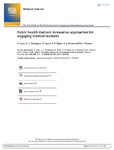Public health matters: Innovative approaches for engaging medical students
| dc.contributor.author | Vyas, A | |
| dc.contributor.author | Rodrigues, VC | |
| dc.contributor.author | Ayres, Richard | |
| dc.contributor.author | Myles, PR | |
| dc.contributor.author | Hothersall, EJ | |
| dc.contributor.author | Thomas, H | |
| dc.date.accessioned | 2018-10-15T08:50:52Z | |
| dc.date.available | 2018-10-15T08:50:52Z | |
| dc.date.issued | 2017-04-03 | |
| dc.identifier.issn | 0142-159X | |
| dc.identifier.issn | 1466-187X | |
| dc.identifier.uri | http://hdl.handle.net/10026.1/12527 | |
| dc.description.abstract |
BACKGROUND: Public health faces the paradox of being increasingly emphasized by the key health and social care regulators and stakeholders, while remaining a largely under-represented discipline in the context of medical curricula. Enhancing medical student engagement in public health teaching is one way to address this concern. METHODS: We discuss four key solutions to the challenges faced by public health educators in medical schools, and present five case studies which demonstrate innovative approaches to engaging medical students in our discipline. RESULTS: Four different approaches have been piloted by members of the Public Health Educators in Medical Schools (PHEMS) network: (i) ensuring social accountability, (ii) demonstrating clinical relevance, (iii) mapping the core curriculum, and (iv) using technology enhanced learning. Preliminary student feedback suggests that these approaches can be used to position public health as an enabler of modern medical practice, and promote a more holistic understanding of medicine by linking patient-centred care to the population level. CONCLUSIONS: The zeitgeist in both academia and the healthcare system supports the teaching of public health within the medical curriculum; there is also consensus at the political and pedagogical level. The challenge of ensuring engagement now needs to be met at the student-teacher interface. | |
| dc.format.extent | 402-408 | |
| dc.format.medium | Print-Electronic | |
| dc.language | en | |
| dc.language.iso | eng | |
| dc.publisher | Informa UK Limited | |
| dc.subject | Curriculum | |
| dc.subject | Education, Medical, Undergraduate | |
| dc.subject | Humans | |
| dc.subject | Public Health | |
| dc.subject | Schools, Medical | |
| dc.subject | Students, Medical | |
| dc.title | Public health matters: Innovative approaches for engaging medical students | |
| dc.type | journal-article | |
| dc.type | Journal Article | |
| plymouth.author-url | https://www.webofscience.com/api/gateway?GWVersion=2&SrcApp=PARTNER_APP&SrcAuth=LinksAMR&KeyUT=WOS:000399556000010&DestLinkType=FullRecord&DestApp=ALL_WOS&UsrCustomerID=11bb513d99f797142bcfeffcc58ea008 | |
| plymouth.issue | 4 | |
| plymouth.volume | 39 | |
| plymouth.publication-status | Published | |
| plymouth.journal | Medical Teacher | |
| dc.identifier.doi | 10.1080/0142159x.2017.1294753 | |
| plymouth.organisational-group | /Plymouth | |
| plymouth.organisational-group | /Plymouth/Faculty of Health | |
| plymouth.organisational-group | /Plymouth/Faculty of Health/Peninsula Medical School | |
| plymouth.organisational-group | /Plymouth/Users by role | |
| plymouth.organisational-group | /Plymouth/Users by role/Academics | |
| dc.publisher.place | England | |
| dc.identifier.eissn | 1466-187X | |
| dc.rights.embargoperiod | Not known | |
| rioxxterms.versionofrecord | 10.1080/0142159x.2017.1294753 | |
| rioxxterms.licenseref.uri | http://www.rioxx.net/licenses/all-rights-reserved | |
| rioxxterms.type | Journal Article/Review |


